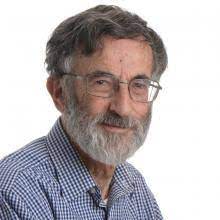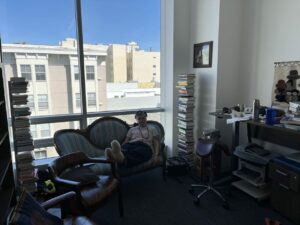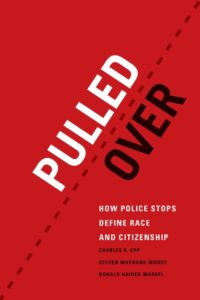
It’s been more than a week since we lost Leslie Sebba, my beloved mentor and teacher at Hebrew University’s Institute of Criminology, and only now have I found the time to write. I spent the entire week at the Law and Society Association’s Annual Meeting in Lisbon, amidst a heatwave, and throughout the week my heart was heavy with the palpable absence of Leslie, who attended the meeting almost every year as a member of our Punishment and Society CRN. And at the same time, there was the uncanny feeling that Leslie was there, because the conversation revolved around ideas that he helped develop and interrogate throughout his professional life. We paid tribute to Leslie at some of the panels, though I was restless with grief because I was unable to attend the funeral and the Shiv’a and tell his family a bit about how inspiring, kind, and special he was.
My first encounter with Leslie’s work was as a law student at HUJI, where I took his course “rights of prisoners and residents of closed institutions.” HUJI’s law curriculum, at the time, was very German, in the sense that there wasn’t a lot of critical theory and empiricism; we sat in big hallways, 150 or even 300 of us, and were essentially lectured at by some of the era’s civil rights luminaries (Ruthie Gavison, Mota Kremnitzer, David Kretzmer.) Occasionally, they asked us a question; sometimes I managed to shine, which made me feel an inch taller, but I wouldn’t go as far as to actually ask a question myself, or (heaven forbid) bring myself to attend office hours. And here was something completely different: an elective course taught by a gentle, absentminded soul, a kind smile perpetually on his lips, a preemptive forgiveness for student laziness or poor behavior, and a gentle door always open for those interested in learning more. The whole thing was bathed in a quiet, gentlemanlike, and at the same time fervent care for the human rights of the most vulnerable people in society, and in big part planted the seed for my later decision to change affiliations and move over to the criminology side of the building. No longer a law student at a formalist, traditional institution, but rather a grad student at a small, rigorous empirical department, I proceeded to take more classes with Leslie throughout my master’s, and his penology course, in particular, was an exquisite tour de force. Leslie was one of the most knowledgeable and well-read people I ever met. It is thanks to him that my education included not just the American classics (though they were certainly there – the entire Johnston, Savitz, and Wolfgang prison canon) but also a lot of European and Pacific materials. I still credit my unorthodox approach to the American abolitionism movement to the fact that, thanks to Leslie, I’m well read on Scandinavian abolitionism from the 1970s. And it is greatly thanks to him that my own students learn a lot about New Zealand’s approach to restorative circles; he had us read primary research about that system when it was hot off the press.
Leslie’s own work, which he assigned with a light, humble hand (he could’ve easily had us read everything he wrote, which was just so, so good) touched on many of these subjects that came to interest me. For one thing, he was a true pioneer of victimology. While his HUJI colleague Menachem Amir published an extremely controversial book examining the concept of “victim precipitation” in sexual assault (and was skewered by feminists), Leslie’s interest in victims was far more humane. In his groundbreaking book Third Parties he tries to piece together the various theoretical legal and criminological strands underpinning the victims’ rights revolution of the 1980s and 1990s. Now, it all seems super lucid and obvious, but when it had just come out in 1996 it was a novel and well balanced effort to critically assess how much of the “victim bills of rights” that were cropping up like mushrooms after the rain was empty rhetoric and how much it would actually improve the lot of victims, especially of violent crime. His pioneering contributions to victimology were also in, basically, making room for the field as its own criminological school; he was the founding editor of the International Review of Victimology and taught a fascinating and popular course on the subject.
Third Parties was emblematic of Leslie’s approach, which straddled the worlds of law and criminology. Leslie possessed the rare and useful mix of someone who could analyze doctrine with unrivaled clarity and sharpness and, at the same time, entertain curiosity about how it plays out in the field and open-mindedly examine critiques. His vast international interests meant that he was preoccupied with international and comparative questions quite a bit; he looked at the worrisome trend of importing American punitivism such as Third Strikes laws and the notion of solitary confinement as an international human rights crime. He also had a crystal clear and lucid approach to Israeli penology, tracing the arc of punitivism back to the amnesties of the 1950s and constantly making the tie between domestic crime control and the Israeli-Palestinian conflict.
Leslie, who had a keen nose for bright and innovative minds like his own, introduced us to the writings of Malcolm Feeley, Jonathan Simon, and David Garland. It was thanks to his gentle encouragement and prodding that I mustered the cojones to attend a concentrated class, in English, from a visiting Malcolm Feeley, leading to intellectual connections that would chart the rest of my professional life. Leslie saw something in me, even as I was a night school grad student in a special master’s program for cops and prison guards (the only hours I could make while working full time as a military public defender), and it is no exaggeration to say that, if I’ve achieved a modicum of success, it is truly thanks to him. While still at the Institute, I was his research assistant as well as his teaching assistant; I was green behind the ears and truly knew nothing, and he gave me responsibilities and kudos far beyond what someone at my age and experience level merited.
Leslie also exposed me to the idea that first-rate theoretical games are fun, but they are completely meaningless if they don’t improve the lives of real people on the ground. The first project with which I helped him was a collaboration with Israel’s Prisoner Rehabilitation Authority, which had just been founded at the time. We were looking for ways to enshrine the right to meaningful labor in Israeli law. Leslie’s other work, on children’s rights, was also done in partnerships, and he was a valued and respected participant and member in initiatives of human rights organizations ACRI and Adallah.
What is truly magical about Leslie the person is that all these incredible world-improving accomplishments lived within a humble, gentle, self-effacing soul. Leslie was never driven by his ego; he supported and trumpeted his students and collaborators, worked well in groups, helped organize panels, and was happy to sit in the audience when a junior collaborator presented his work. His gentle, fatherly mannerisms belied a keen mind always devoted to improving justice. And he took great pleasure in his work – while lecturing, he always seemed to be having an interesting, enriching conversation within his own mind (it was not rare for him to pose a question and, in the same breath, answer it in two contradictory ways with a bemused face.) A great light has dimmed and the world of law, criminology, and criminal justice is impoverished for his departure. What is remembered, lives.




4 Comments
Thanks for this really wonderful tribute to my dear brother
Judy Sebba
You are very welcome, Judy. My deepest condolences to all of you.
Dear Hadar,
Thank you for your lovely tribute to our friend Leslie. We met through family connections and have many wonderful memories of time spent with him and his family.
His modesty was such that we had little understanding of his academic standing. We know only of the gentle kindliness and humour you mention.
A favourite memory is of an afternoon we spent punting and picnicking on the river in Oxford with Leslie, Varda and Doron.
We send our love to you, all the Sebba family, his friends and colleagues.
Ian and Linda Buchanan.
Thank you for writing, Ian and Linda – what wonderful memories you have of Leslie.